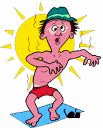Burns and Poisons
| Three Degrees of Burns: |
Superficial burn – skin is red and is sore.
Partial Thickness burn – skin is red with blisters and is painful.
Full Thickness burns – black waxy colour, nerves have been burned. |
| Six Main Types of Burns: |
 Cold – caused by ice. Cold – caused by ice.
Wet – caused by hot fluids.
Dry – caused by dry heat like fires.
Chemical – e.g. bleach.
Radiation – e.g. Sunburn.
Electrical – caused by electricity. |
The main treatment for burns is covering the affected area in WATER for ten – fifteen minutes. All burns on people, which are bigger than their own hand, or are intermediate or deep degree burns should be sent to the hospital. For people with burns to the mouth and throat you should give them short sips of water.
DO NOTS OF BURNS:
- Do not burst Blisters or touch the injured part.
- Do not remove stuck on clothing.
- Do not apply ointments lotions or fats.
- Do not apply stick plasters or cotton wool on the burn.
- Do not overcool the casualty as this can lead to hypothermia.
- Do not touch a person who has been a victim of an electric shock as you could injure yourself.
- Note: if a person is in contact with high voltage electricity, you must remain 18 meters (20 yards) from them and contact the emergency services and inform them of the incident.
POISONS: are substances that if taken in sufficient quantities can cause temporary or permanent damage to the body.
| Poisons enter the body through (LIAM & E) |
L – Lunges by breathing fumes in.
I – Injection by needle.
A – Absorption through your skin
M – Mouth by swallowing things.
E – Eyes, splashes in the eye. |
If someone has swallowed a poison you should bring them to hospital with the details of the exact amount and the product they have taken. You should never make somebody to get sick.
Poisons can act either locally or generally on the body. Locally is where it reacts at the site of the burn e.g. food passage or hand. Generally is where it affects the central nervous system and can interfere with breathing and your heart action.
 ANAPHYLACTIC SHOCK: This is a severe allergic reaction within the body to a poison, e.g. with bee and wasp stings.
ANAPHYLACTIC SHOCK: This is a severe allergic reaction within the body to a poison, e.g. with bee and wasp stings.
Next Lesson [Back to Top]
 Cold – caused by ice.
Cold – caused by ice. ANAPHYLACTIC SHOCK: This is a severe allergic reaction within the body to a poison, e.g. with bee and wasp stings.
ANAPHYLACTIC SHOCK: This is a severe allergic reaction within the body to a poison, e.g. with bee and wasp stings.